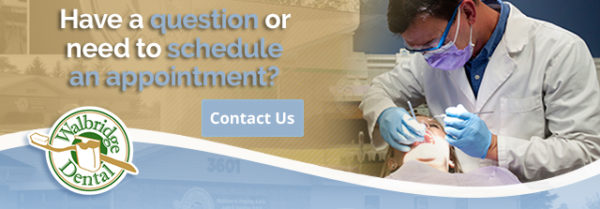
Do you wince in pain when you enjoy a bite of ice cream or a sip of your morning coffee? The feeling of discomfort from eating or drinking our favorite foods can be irksome – or downright upsetting. Many people ask us “why are my teeth sensitive” and the reality is that it could be for several reasons!
Read on to learn about the causes of sensitive teeth and solutions you can take to fight back and maintain good oral health.
Are Your Teeth “Sensitive”?
The feeling of sensitivity in your teeth is usually easy to diagnose. It can range from a light discomfort to a sharp, severe pain. It almost always happens when you eat or drink something with an extreme temperature: cold foods like ice cream or even fruits straight out of the fridge, or hot drinks like coffee or tea. Even sweet or sour substances can cause the effect, regardless of temperature. In extreme cases, just inhaling cold air might trigger pain!
If this sounds like you, then you likely have sensitive teeth. But why are your teeth sensitive? Here are the most common causes:
Why Do I Have Sensitive Teeth?
Tooth sensitivity happens when the dentin of a tooth is exposed. Normally, the dentin is covered by enamel above the gum line and cementum below the gum line. When enamel or cementum is worn away, nerve endings in the dentin are exposed resulting in sensitivity. There are a number of causes of sensitive teeth. Some of them have to do with your behavior, and some are related to the condition of your teeth and gums.
Brushing Too Hard
When people ask us “why are my teeth sensitive” and we suggest it may be because they brush too hard or often, they’re always surprised! Most people think that more brushing is always a good thing – and that brushing harder means you’re getting your teeth even cleaner. Unfortunately, there is such a thing as too much brushing.
Toothbrushes are inherently abrasive. That’s how they remove bacteria or plaque from our teeth! But when you brush too hard, you’ll actually start wearing away the enamel all on your own. We brush our teeth partly to protect that enamel in the first place, so it can make brushing detrimental to your oral health.
When you wear through enough enamel, nerves in your teeth become exposed. They aren’t used to such direct contact with hot or cold substances, which leads to tooth sensitivity.
The solution: be mindful when you brush. Use just enough force, but don’t brush so hard that it hurts. Using an electric toothbrush can help make sure you’re brushing thoroughly without the need for pressing so hard that you damage your enamel.
Grinding Your Teeth
Have you ever been told that you grind your teeth? Your loved ones may notice from the sound, or your dentist may have identified it from the look of your teeth. Also known as bruxism, teeth grinding is a serious problem that leads to issues, including sensitive teeth!
Many people who grind their teeth do it without thinking. Most cases happen while you sleep, which means you can’t simply consciously stop it. Even during the day, stress can lead some people to grind their teeth even though they don’t realize it.
Over time, this grinding wears down your teeth and exposes the nerves just like over-brushing. The result will be sensitive teeth and a host of other problems.
The solution: bruxism can often be solved through the use of a nighttime mouthguard. You simply need to wear them when you go to sleep, and they provide a protective barrier between your top and bottom rows of teeth so they can’t grind against each other.
Additionally, bruxism is often related to stress. While it’s easier said than done, reducing stress in your home or work life can often solve unconscious grinding all on its own.
Acidic Foods
Another unintentional way we lead ourselves towards sensitive teeth is with diets high in acidity. Acidic foods or drinks will directly wear away at your enamel as you eat or drink them. This includes a wide variety of fan favorites, from citrus fruits to tomato sauce and carbonated beverages.
In addition to direct damage, acidic substances leave your teeth vulnerable for some time after you finish enjoying them. It may seem counterintuitive, but brushing your teeth right after drinking a soda can actually be more harmful than letting it be. The abrasiveness of the brushing will be multiplied by the weakened tooth enamel from the acid, making it easy for you to remove enamel and exacerbate your sensitive teeth issue.
The solution: reducing or eliminating these foods from your diet is the best solution. The less acidic food you consume, the less time your teeth will have to spend fighting off the damage. Another great tip is to chase any acidic food or drink with a nice glass of water. While your saliva does a great job protecting your mouth, drinking water will help dilute or remove some remnants of the acidic substance.
Excessive Tooth Whitening
Are you looking for a brighter, whiter smile? Unfortunately, in your journey towards a Hollywood-ready set of teeth, you may be making your teeth overly sensitive! The ingredients that work to whiten your teeth also remove minerals in the enamel and can lead to your teeth being temporary porous. This means micro-tubules in the teeth are exposed, and you’ll recognize the feeling as sensitive teeth.
The solution: in-office whitening is your best bet for whitening your teeth. It helps prevent overuse of whitening substances, provides the most effective treatment, and lets you enjoy the benefit of a trained dentist monitoring the process.

Do You Have Dental Health Questions? Schedule an Appointment!
If you have dental health concerns or are just looking for information, the professionals at Walbridge Dental provide complete family dental care to families in the Millbury community. Contact us online to set up an appointment now or call us at 419-836-1033.
Connect on Social Media!
